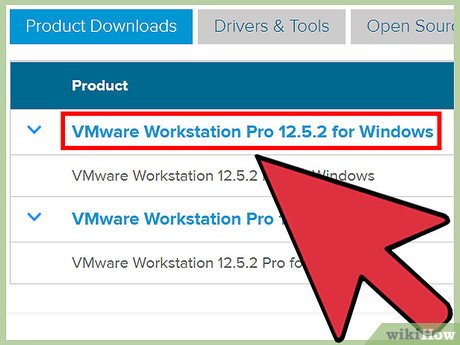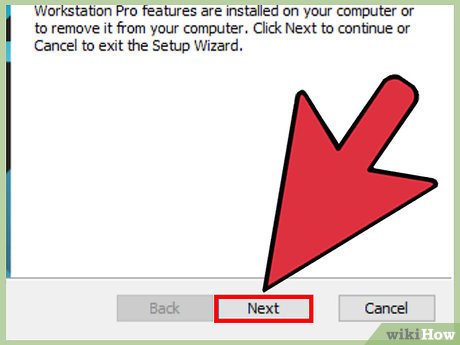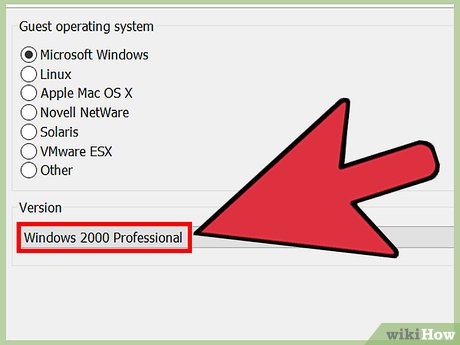How to Run a Windows Longhorn Virtual Machine in VMware
Part 1 of 3:
Installing VMware Player/Workstation
-
 Download VMware Player or VMware Workstation. Before we can start installing Windows Longhorn, we will need a virtual machine program that can run it. For this, it's best to use VMware Player, as it has the best compatibility for Windows Longhorn. You can use VMware Workstation as well.
Download VMware Player or VMware Workstation. Before we can start installing Windows Longhorn, we will need a virtual machine program that can run it. For this, it's best to use VMware Player, as it has the best compatibility for Windows Longhorn. You can use VMware Workstation as well.- To download VMware Player, visit: https://my.vmware.com/web/vmware/info/slug/desktop_end_user_computing/vmware_workstation_pro/12_0
- To download VMware Workstation, visit: https://my.vmware.com/web/vmware/free#desktop_end_user_computing/vmware_workstation_player/12_0
-
 Go through the install process. Once installed, run VMware.
Go through the install process. Once installed, run VMware.- These steps focus on VMware Player, so the steps may differ slightly for VMware Workstation.
Part 2 of 3:
Installing Windows Longhorn
-
 In VMware Player, click Create a new Virtual Machine. You will need an .iso file to install it.
In VMware Player, click Create a new Virtual Machine. You will need an .iso file to install it. -
 Go to this directory. Select "Microsoft Windows Vista ("Longhorn" 6.0.4074.0) (beta) and then download.
Go to this directory. Select "Microsoft Windows Vista ("Longhorn" 6.0.4074.0) (beta) and then download. -
 In the Create a Virtual Machine wizard, select the Installer Disc Image File (iso): option then browse to the downloaded iso and select it.
In the Create a Virtual Machine wizard, select the Installer Disc Image File (iso): option then browse to the downloaded iso and select it. -
 Select Microsoft Windows then Windows XP Professional. There is no option for Windows Longhorn because it is not officially supported by VMware.
Select Microsoft Windows then Windows XP Professional. There is no option for Windows Longhorn because it is not officially supported by VMware. -
 Name your VM. It can be called something like Windows Longhorn, or Windows Vista Beta, and so on.
Name your VM. It can be called something like Windows Longhorn, or Windows Vista Beta, and so on. -
 Select the amount of hard drive space you want to give to Windows Longhorn. Something like 30GB or more is good.
Select the amount of hard drive space you want to give to Windows Longhorn. Something like 30GB or more is good. -
 Click Customize Hardware, and then put the memory higher. For instance, if you have 8GB of memory, you can give it 4GB. Note that there is no point giving it more than 4GB, because x86 operating systems do not support more than 4GB of RAM.
Click Customize Hardware, and then put the memory higher. For instance, if you have 8GB of memory, you can give it 4GB. Note that there is no point giving it more than 4GB, because x86 operating systems do not support more than 4GB of RAM.- Do not give all the RAM you have on your computer. This will really slow down your computer, and force it to switch to the page file. Give your VM about half of the memory you have, but no more than 4GB.
- Now, before installing, you need to edit the configuration file; otherwise it won't boot.
Part 3 of 3:
Editing the .vmx File so Windows Longhorn Can Boot
-
 Go to Documents, (or My Documents if your on Windows XP) and then open the folder Virtual Machines.
Go to Documents, (or My Documents if your on Windows XP) and then open the folder Virtual Machines. -
 Go into the folder that has the name of your Virtual Machine, for example Windows Longhorn.
Go into the folder that has the name of your Virtual Machine, for example Windows Longhorn. -
 Find the .vmx file. You will see a whole bunch of files, we are looking for the .vmx file. If you can't see .vmx on the end of any of the files, you will need to do this.
Find the .vmx file. You will see a whole bunch of files, we are looking for the .vmx file. If you can't see .vmx on the end of any of the files, you will need to do this.- If you are on Windows XP, click Tools (in the folder we are currently in) then Folder Options. Click the View tab, then select the option called, "Hide extensions for known file types". Uncheck the box, then click Apply, then OK.
- If you're on Windows Vista/7, click Organize, then select Folder and Search Options, and do the same as above.
- If you're on Windows 8/8.1/10, click the View tab in the ribbon, then click Options and do the same as in step 4.
-
 Right click on the .vmx file, and choose Open With, then Default Program.
Right click on the .vmx file, and choose Open With, then Default Program.- If you're on Windows XP/Vista/7, select Notepad. Uncheck the box that reads something like Always open this sort of file with this program.
- In Windows 8/8.1/10, do the same as above, but click More Options, and then uncheck the box that says, "Use this application for all .vmx files" and then choose Notepad. In Windows 10, you'll need to click OK as well.
-
 Look for the text that reads, virtualHW.version = "12", and change 12 to 7. Now save and exit.
Look for the text that reads, virtualHW.version = "12", and change 12 to 7. Now save and exit. -
 Go back to VMware and install your Windows Longhorn virtual machine as normal. Everything should boot up!
Go back to VMware and install your Windows Longhorn virtual machine as normal. Everything should boot up!
Share by
Samuel Daniel
Update 05 March 2020














